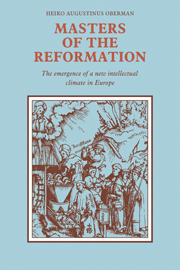Book contents
- Frontmatter
- Contents
- Preface
- Abbreviations
- Map
- PART I INTELLECTUAL RENEWAL
- PART II THE GRAPES OF WRATH
- PART III NEW JERUSALEM WITHIN THE OLD WALLS
- 10 Magistri and magistracy: the old and new masters
- 11 The great visitation: bishop and city
- 12 The onset of the Counter-Reformation
- 13 The Reformation: a German tragedy
- Student population at German universities 1385–1540
- Chronological outline
- Bibliography
- Index of names and places
- Index of modern authors
- Subject index
13 - The Reformation: a German tragedy
Published online by Cambridge University Press: 07 October 2011
- Frontmatter
- Contents
- Preface
- Abbreviations
- Map
- PART I INTELLECTUAL RENEWAL
- PART II THE GRAPES OF WRATH
- PART III NEW JERUSALEM WITHIN THE OLD WALLS
- 10 Magistri and magistracy: the old and new masters
- 11 The great visitation: bishop and city
- 12 The onset of the Counter-Reformation
- 13 The Reformation: a German tragedy
- Student population at German universities 1385–1540
- Chronological outline
- Bibliography
- Index of names and places
- Index of modern authors
- Subject index
Summary
Tthe sixteenth century had a special affection for aphoristic wisdom. Blarer's epigrammatic marginal comments, made either in enthusiastic approval of Summenhart's theological social theory or in mischievous denunciation of Fabri's rejection of the Reformation, typify the style of that period. Not only Erasmus, but also his theological, psychological and cultural counterpart in Wittenberg prized proverbs. Yet, significantly enough, Luther preferred the vernacular wisdom of the peasant's hearth and artisan's workshop to Erasmian adages. For Luther, such proverbs expressed an unbroken empirical tradition of folk and worldly wisdom which the learned lords of the university had scholastically emptied of all signs of life and then proudly refilled with their own absurdities whisked from a classical bag of mythological tricks. That sort of educational veneer, an eruditio vana et curiosa, contrasted unfavourably with the tart vernacular folk wisdom.
It was precisely Luther's medieval and scholastic education that freed him to appreciate the worldly wisdom of the populace alongside holy scripture. The Erasmian humanists took up the opposite position, recognizing as wise only that which had established its worth under the watchful eye of classical antiquity. With the dross of medieval barbarity burned away in the fires of erudition, this refined classical wisdom could now be introduced to its proper purpose and destination: contemporary religious devotion. The disputed legitimacy of secular wisdom was established not in conjunction with the controversy over free will, but in the course of determining the relationship between Christian faith and the profane world.
- Type
- Chapter
- Information
- Masters of the ReformationThe Emergence of a New Intellectual Climate in Europe, pp. 260 - 295Publisher: Cambridge University PressPrint publication year: 1981



